April’s Child Lydia Adams
If you'd like to read the full-length version of this interview , please revisit this page on April 1
If a friendly fellow traveller asked about your work … ?
I would say that I have the privilege of conducting two great choirs, the Amadeus Choir and the Elmer Iseler Singers and have the great honour of presenting wonderful music with fantastic people. I'd say how much I love what I am doing and would invite them to a concert. I'd have a brochure for each choir on hand!
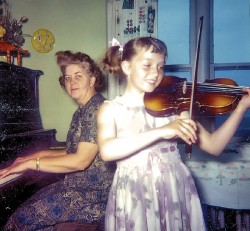 If you could travel back through time and talk with the young person in that photo is there anything you'd tell them?
If you could travel back through time and talk with the young person in that photo is there anything you'd tell them?
Stay curious through life. Have confidence in yourself. Keep your sense of humour!
Do you remember that childhood photo being taken?
Absolutely. It was my tenth birthday. I had on my ‘Festival Dress’ (sent to me by my Aunt and Uncle in Chicago!) and I had just received my new full-sized violin from my parents as my birthday gift.
Up to that point, I had been playing on a three-quarter sized violin. My Dad was the photographer – he had his Brownie, and he snapped the shot. Though piano was my great love, I became the concertmaster of the Cape Breton Youth Orchestra. However, I did observe that there were many people fairly relieved to know that I was giving it up to focus more on piano. I was no threat to Jeanne Lamon!
When you look at the photo today, what does it make you think about?
So many memories – my mother, Florence Adams was an integral part of my musical life and it is so appropriate that she is in this picture with me and that Dad is also represented as the photographer and supporter, a role he took on his whole life.
This room, by the way, was actually the dining room – we used to eat here before the grand piano arrived!
This very room is where my mother hosted her legions of students for their piano lessons. It's also where the piano examiner, Carleton Elliott from Mount Allison University, would come for the yearly exams.
My mother created a musical hub in this room. There was always music here.
We had great music making with so many friends including soprano Lorna MacDonald (Lois Marshall Chair in Voice, University of Toronto) and soprano Valerie Kinslow (Head of Voice at McGill University) plus many, many others. Many of these musicians went on to a career in music and many others went on to other careers and have kept music as a central part of their lives. There were many parties in this room, usually centred around music and it always reminds me of great friends and the collegiality we shared.
The house is literally a block from the Atlantic Ocean, and I could look out on the ocean as I practised, through the window you can see in the picture. My father built this house and he would bicycle over after work each day and build day by day his family’s home. In order to build it, he took night classes in Glace Bay for his Draftsman's papers, etc., all the while working for the Coal Company. I couldn’t have had two more wonderful parents who led by example with a true sense of the Cape Breton spirit
It is actually a wonder that we children lived. I would go down to the ocean as a young child with my best friend, Mary Clare MacKinnon, (a pianist and singer who also practises law) and jump the ice floes (a very dangerous practice called ‘Squishing’.) We also engaged in many other dangerous practices at the ocean – wandering out far on the reef and we also created situations where the fire department had to be called – what a great time we had! The ocean and all around it was our playground!
We only stopped to make music.
What is your absolute earliest memory of hearing music?
Apparently, as the story goes, my mother brought me home from the hospital, handed me to my brother, and immediately taught a piano lesson to a waiting student (there was an important exam coming up!), so I guess that will have been the very first time I heard music after birth. I can’t really remember a time in our house without music. There were piano lessons before school, at lunchtime and after school.
My mother was one of the two piano teachers in our town of Glace Bay, N.S.
She also was a registered nurse. She gained her teaching diploma during WW2. Imagine, she was the night nursing superintendent at the Glace Bay General Hospital and also taking her piano and organ lessons and sending her Theory and History of Music to Trinity College, London, England, by ship during the war, for corrections.
Are there (or were there) other musicians in your childhood family?
My father had a beautiful natural singing voice and my father’s mother used to sing songs in Gaelic, her native tongue.
My childhood was filled with music from family members. My maternal grandmother had been a church organist until she was crippled with severe arthritis. She had a sister (Sue) who was one of the first graduates in voice from Acadia University - Sue was a contralto. My maternal grandmother also had a brother (Grover) who had a fine tenor voice. I am still using one of his Elijah scores today. They all read music and my grandfather owned a store where he sold pianos and organs.
My mother, of course, was a musical whirlwind. Her siblings were also musical. She would sing duets with her sister, Ivy. Family members still remark on how musical they were. My mother started choirs specifically so that I would have a choir to sing in. She saw the need for our young teenagers’ group to continue singing beyond junior choir and so founded The Glace Bay Teenaires. She took them on tour to Kitchener/Waterloo, Niagara Falls, Montreal (Expo 67) and to Aberdeen, Scotland for the International Gaelic Mod. (It had been the National Mod to this time and our appearance made it international.) All this happened in a town where there really was no money at all.
Poverty was rampant, but the miners made sure that their children had music. Mom certainly gave many, many lessons, played for many, many services and taught in the Glace Bay schools for no payment. She was passionate as a “Music Warrior.” My brother, Robert, played piano as well, but gave it up for a career in broadcasting at the CBC and later in computers.
Where did hearing music fit into your life as a child?
CBC was a musical lifeline to us in Cape Breton, as well as in most parts of the country, I suspect. We listened to everything: Elmer Iseler conducting Handel’s Messiah each Christmas; the Christmas Eve service from King’s College, Cambridge, with David Willcocks conducting; the marvellous voices of Lois Marshall and Maureen Forrester, people I later knew and worked with. It’s amazing that I also realized my dream of working with both those conductors as well.
My parents also took me to hear the Atlantic Symphony and Community Concerts series, and one such concert proved to be a life changing experience. It was held in Baddeck at the High School gym, a two hour drive for us. I was five or six years old and remember vividly hearing a young Maureen Forrester sing. I placed myself in the front row and almost clapped my hands off, I was so excited. On the way home, I declared to my parents that I wanted to be a musician.
My parents also had a rich body of recordings available for me to hear, and these were very important to me. One was of Wanda Landowska playing the Bach Well-Tempered Clavier on the harpsichord. I was transfixed. I recall when I was around10 years old wearing out the recording of the 1954 Vienna Choir Boys recording of Schubert’s Ständchen (D920).
My father, Robert Adams, was a blacksmith working in the Forge making parts for the mines for the Dominion Coal Company. When he arose to go to work I would rush down and join him at breakfast. Once he left for work, because it was still dark, I could see my reflection in our front window and I would play that recording over and over while trying to conduct it. It must have been something for the neighbours to see this small child waving her arms in the window as they passed by on the way to work. (My mother took the whole Junior Choir, and all the neighbourhood children, to see the Vienna Choir Boys movie Almost Angels).
What is your first memory of yourself making music?
If you look at the top of the Heintzman piano Mom is playing in my child picture, you will see a small wooden piano (like Linus plays!). My very first memory of music making was playing that piano, a gift from my Aunt and Uncle “from away,”’ in piano duets with my mother. I would sit on the floor to play.
What was your first instrument, and when did you first conduct?
My first instrument is and always will be the piano. I just love it, love the sound, love “making friends” with pianos and love the repertoire. My real joy is playing Bach.
Aside from my “front room conducting,” my first actual conducting happened after a major service at St. Paul’s Church (the church where I grew up,) and where my Mom was the organist and music director. She would have these enormous services which absolutely packed the church of 1,000 people. Her choirs were large and shone especially at Christmas and Easter. The week after those services, she would usually be in bed with a migraine headache, and would send me down, even as a young child, to take the organ and the choir for the day. I loved this, even though I didn’t play the organ. I pretended I did, and just blew the roof off the church with that magnificent Cassavant. I am sure the church people and the choirs were really happy to have Mom back the next week.
What do you remember about your first music teacher?
My first teacher was my mother. She was a brilliant teacher and inspired thousands of students young and old throughout her career. I think my Mom and Dad made an excellent decision, however, to send me to the other piano teacher in town, Marguerite MacDougall, when I was 4 or 5. Before that, my mother was wise – she didn’t push me – but she did leave beginner books out on the piano and I was forever going to her with “What’s this, Mommie?” questions all the time. These beginner books got more difficult as I grew older: I started to find Messiah, Elijah’ and other scores on the piano. I would love to go through those scores from top to bottom, singing all the solos and choruses as I went. Mom told me that she would always be my “pretend teacher” if I ever had any questions. That situation was perfect, because I did go to her often, of course.
I loved Marguerite (Mrs. MacDougall) completely. She was a wonderful pianist and was the very first graduate from Mount St. Vincent in Halifax with a performance degree in piano.
Marguerite was raising a large family and played for every major concert or musical in Cape Breton, from the staged musicals sponsored by the Rotary Club to a 14 year old Itzhak Perlman in concert (really!) to Lassie. She played from the Bach Well Tempered Clavier for world champion figure skater Barbara Ann Scott in the Glace Bay Forum and she loved working with Victor Braun (Russell’s father) in the musical, The Song of Norway, which ended with the first movement of the Grieg concerto. Victor was the “star” they brought in “from away” (a term of reference for those not born on the Island.)
Marguerite was a brilliant pianist and our piano lessons were filled with laughter and positivity. She hated asking people to play their “technique” and we usually blew right through the scales and arpeggios to the music. She would dismiss them and say “You can play those,” and we would move on to the wonderful world of Chopin or Brahms. I can hear her play in my mind’s ear even now.
Every now and then, you would hear the yowling of her cat as it made its way down the chimney from the roof, landing at the bottom with a thump. It then would shake itself off and walk with great dignity into the living room (and the lesson would go on!). Her home, like my parent’s, was always full of energy and wonderful hospitality. These were homes where friends and strangers were always welcome and the rooms were filled with stories, laughter and music.
In my final year of high school, it was decided that I would go to Mrs. Dorothy Sutherland, a British concert pianist who lived in Sydney. She was elegant and gracious: an elderly woman who had come to Canada when her husband’s business brought them here. Her home was one of quiet civility and, playing at her home, I experienced the magic of a Steinway piano for the first time.
What were your first experiences of making music with other people?
My Mom conducted the choirs in our church and I was a member of the Junior Choir before I had even started school. I also had great friends in the neighbourhood who were hooked on music. The greatest thing we could think of doing after school or on weekends was getting together to play pianos duets and (after the second and then the third piano moved into our fairly small house) – piano duos were the rage! We would run through a whole book of Mozart works – or operas written for piano and piano duo – or Fauré works – whatever we had on hand – not stopping! We would test out sight-reading doing this – just kept going, no matter what, full speed! - dragging the other person through if they stumbled. We also thought that “perfect pitch” was the norm. Everyone seemed to have it.
Do you remember the point at which you began to think of yourself as a career musician?
This will be rather convoluted.
I had finished university and left to study further at the Royal College of Music in London, England, with Kendall Taylor, the great Beethoven specialist. I really had very little confidence at the time and decided to study in England to work with some of the best musicians and find out if I belonged at a professional level.
But studying piano was all a ruse, as the real reason I was going to England was to study with David Willcocks, the great choral conductor who had done such incredible work and made such sublime recordings with the King’s College Choir in Cambridge, and who was then coming to the RCM as its director. I was in awe of him. The College didn’t offer a course with David and he knew nothing of my plan of coming to work with him.
I guess I should tell the story here of how I met him.
I arrived in London in 1976 knowing no one – not one person – and had arranged a place to stay in Chelsea, a short distance away from Prince Consort Road, where the Royal College of Music sprawled across the street from the Royal Albert Hall. I decided to walk up and find out just how long it would take to get there in the morning, when the Director’s address would take place at 9:00 a.m. the next day. As I was walking up, I knew the rain was about to start and was rounding the corner of Prince Consort Road when it began coming down hard.
I got into the College completely soaked and there was no let-up of the rain in sight.
It was 5 minutes to 5. The College closed at 5:00 p.m.
The very lovely commissionaire who was on the desk informed me that I would have to leave the building in the next 5 minutes UNLESS I was auditioning for the choir. I had no idea what the choir was, who the conductor was, but in a split second decided that whatever it was, I was going to do that audition.
It turned out to be the audition call for the 300 voice Bach Choir, which David Willcocks conducted. Fifteen minutes later, in a strange twist of fate, I was face to face with my idol. I did the audition completely in awe – I could hardly sing – no breath. He took pity on me and I became a member of that wonderful choir with 300 new friends. He was very gracious to allow me to conduct this incredible group from time to time, as well as accompany the RCM Chorus.
One notable time with the RCM Chorus was when we were rehearsing a new work by Dr. Herbert Howells. Dr. Howells came into the room. Immediately after welcoming Dr. Howells to the rehearsal and seating him on the stage in front of the choir, David dragged me from the piano and he went to the piano and I had this incredible experience of conducting the choir in a work by Herbert Howells with the composer about a foot from my right arm. Daunting but thrilling!
My very first performance in England with Sir David conducting was as part of the RCM choir singing St. Nicolas, with Peter Pears singing the main role for Benjamin Britten’s Memorial Service. My final performance there with Sir David was as part of the Bach Choir singing the wedding of Charles and Diana. Sir David Willcocks gave me countless and wonderful opportunities as a student – and it is from him that I gained my confidence as a professional musician. I will be forever grateful.
My great influence here in Canada was Elmer Iseler. I was absolutely dumb-struck when he and the Festival Singers of Canada arrived at Mount Allison for a concert and I heard R. Murray Schafer’s Epitaph for Moonlight for the first time.
I absolutely knew that I would be working with Elmer in the future and was thrilled to play for the Elmer Iseler Singers for 17 years. I am now so honoured to conduct the choir of professional singers which bears his name. As you may know, I arrived at the position of Conductor/Artistic Director of the EIS because of the illness and passing of Elmer, so it was a tough time for us all.
It is also rare that a named choir survives its founder, and we had to all convince ourselves, starting with the Iseler family, myself, the board of directors, the Singers, the arts councils and our audiences, both in Toronto and throughout Canada, that the choir should go forward. I had some doubt suggested to me by one arts council member as to whether I could “'handle” a second choir but aside from that person, I received overwhelming support.
Do you remember a time when you thought you would do something else?
If so, what were those things?
No. However, as a child, I did entertain being a truck driver for a (very short) while, or a Mountie (love the uniform!).
UPCOMING PERFORMANCES …
We are excited to be working with Canada’s first female astronaut and neurologist in space, Dr. Roberta Bondar. The Amadeus Choir and the Elmer Iseler Singers, will present a wonderful joint concert in collaboration with the Ontario Science Centre and the Dr. Roberta Bondar Foundation on April 21, 8pm at the Ontario Science Centre. This concert will honour Dr. Bondar’s 20th anniversary into space. Within the program, there are two World Premieres to honour the occasion and Dr. Bondar will be there and will speak.
Recent recordings …
The Toronto Symphony Orchestra’s in-house record label tsoLIVE released Gustav Holst: The Planets, the TSO's fifth in a series of self-produced recordings. It was recorded live at Roy Thomson Hall, and features TSO Music Director Peter Oundjian, the Toronto Symphony Orchestra, the women of the Elmer Iseler Singers and the Amadeus Choir.
The Elmer Iseler Singers’ own two most recent CDs are both special. We recorded a Christmas CD with Eleanor McCain in the fall and the one before that was a CD of Peter Togni’s ‘Lamentations of Jeremiah’ with bass clarinettist Jeff Reilly.
Both choirs are planning new CDs for the coming year.
Looking towards the future, Lydia Adams offers some additional comments from another recent interview:
I don't think that Canadian Choral Music has ever been stronger in Canada - the choirs are magnificent throughout the country. So many young and terrific choral conductors are taking on positions and making the choral art incredibly strong here.
Another wonderful thing happening is the rise of great Canadian choral composers who are gaining international reputations for their writing. It is a fantastic and crucial three-way partnership - composer, conductor and choir - we all need the others for everyone to flourish.
What we need now is to continue being proactive to our governments and arts councils to make more money available for choirs. We know the importance of choral music for the human heart and soul and we need to continue being vocal about it.
We all can be activists - audience members - singers - conductors - everyone - to encourage and keep encouraging our governments to put money into the arts.
They need to know that music generally, the arts, and choral music specifically are all so important to our society and to the development and creation of great citizens of our nation.
Who is May’s Child?
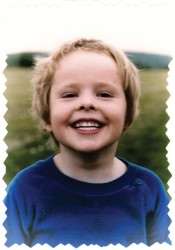 Discovered by music only at the end of high school, he has two special reasons to sing expressively, with impeccable diction.
Discovered by music only at the end of high school, he has two special reasons to sing expressively, with impeccable diction.
In “high” demand internationally, he’s made two Aldeburgh connections this season, joins Orchestra Toronto for Beethoven’s Symphony No.9 in May, and in all his spare time he’s training for that “someday” half-marathon.
Know our mystery child’s name?
Send your best guess to musicschildren@thewholenote.com.
Provide your mailing address in case your name is drawn from correct replies received by midnight on April 20, 2012.
This spring and summer, I think I’ll be a Christian knight, impervious to feminine allure!
Starting in Toronto, I’ll travel to the Opéra Royal de Versailles, France, and The Glimmerglass Festival in New York State!
CONGRATULATIONS TO OUR WINNERS! HERE’S WHAT THEY WON
![]()
 Music of the Spheres (April 21, 8pm). The Amadeus Choir and the Elmer Iseler Singers, conducted by Lydia Adams, join forces at the Ontario Science Centre for two world premieres. Beyond Earth by Lydia Adams, text by Roberta Bondar, with images from Dr. Roberta Bondar’s photographic explorations, along with And Yet It Moves, by Jason Jestadt. Meet guest speaker Dr. Bondar and enjoy some special star-gazing afterwards! Andrew Kellogg and Helen Spiers each win a pair of tickets.
Music of the Spheres (April 21, 8pm). The Amadeus Choir and the Elmer Iseler Singers, conducted by Lydia Adams, join forces at the Ontario Science Centre for two world premieres. Beyond Earth by Lydia Adams, text by Roberta Bondar, with images from Dr. Roberta Bondar’s photographic explorations, along with And Yet It Moves, by Jason Jestadt. Meet guest speaker Dr. Bondar and enjoy some special star-gazing afterwards! Andrew Kellogg and Helen Spiers each win a pair of tickets.
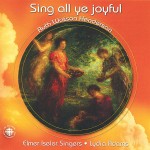 Sing all ye joyful: Music of Ruth Watson Henderson. This Elmer Iseler Singers’ recording, conducted by Lydia Adams, is devoted entirely to the choral music of Ruth Watson Henderson. Recipient of several awards, perhaps the greatest honour paid to her is that choirs from all over the world, and at home in Canada, sing her music and sing it often. (CBC Records MVCD 1167) A copy goes to Dale Sorensen.
Sing all ye joyful: Music of Ruth Watson Henderson. This Elmer Iseler Singers’ recording, conducted by Lydia Adams, is devoted entirely to the choral music of Ruth Watson Henderson. Recipient of several awards, perhaps the greatest honour paid to her is that choirs from all over the world, and at home in Canada, sing her music and sing it often. (CBC Records MVCD 1167) A copy goes to Dale Sorensen.
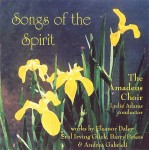 Songs of the Spirit features the Amadeus Choir performing Eleanor Daley’s Requiem, works by Srul Irving Glick and Barry Peters, and the world premiere recording of Missa 4 Vocum by Andrea Gabrieli. Lydia Adams, conductor. (AMA9900) A copy goes to Lilli Killian.
Songs of the Spirit features the Amadeus Choir performing Eleanor Daley’s Requiem, works by Srul Irving Glick and Barry Peters, and the world premiere recording of Missa 4 Vocum by Andrea Gabrieli. Lydia Adams, conductor. (AMA9900) A copy goes to Lilli Killian.


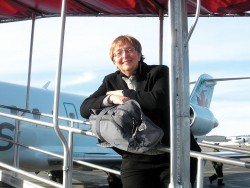


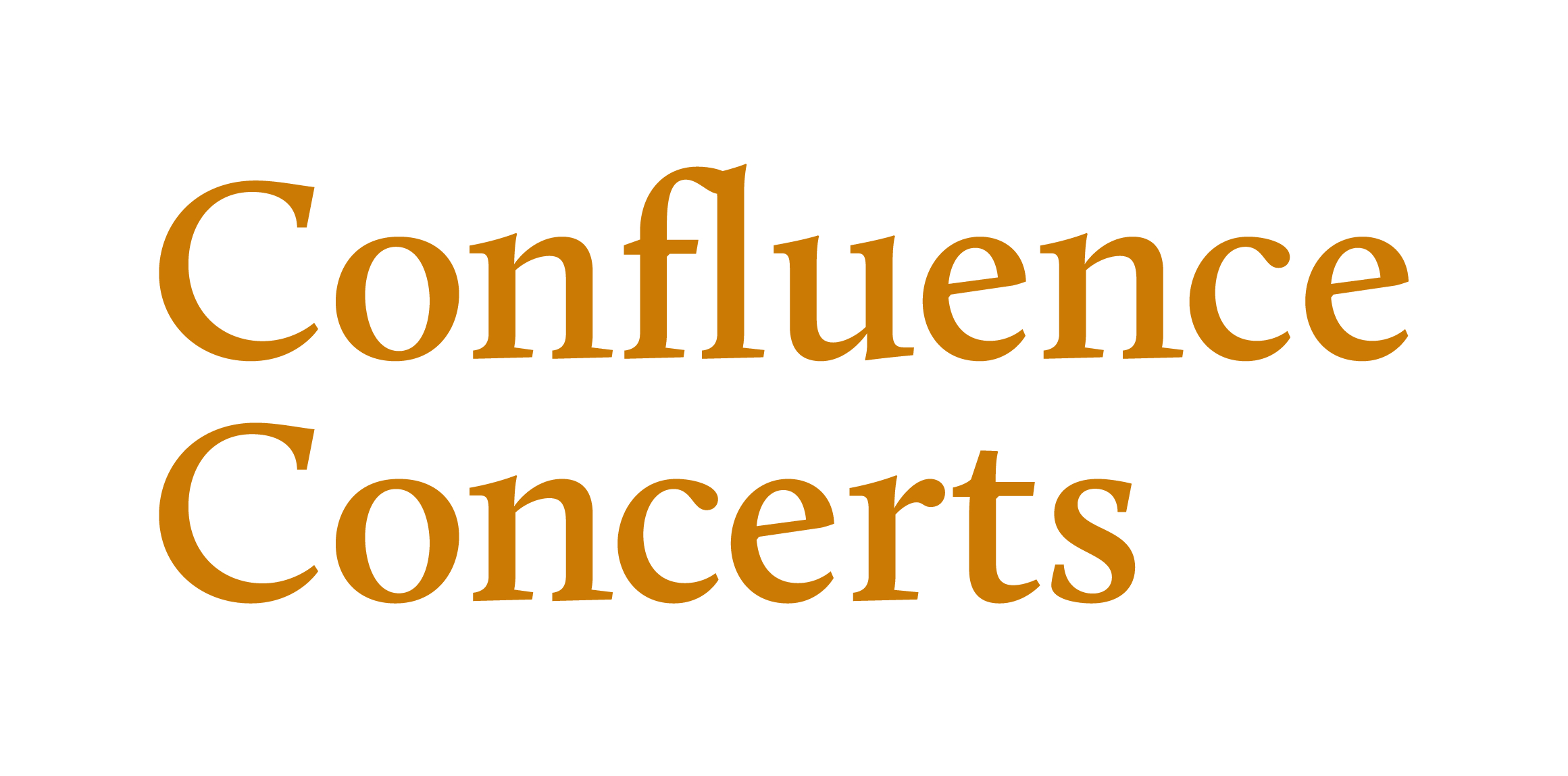 Confluence Concerts: The Mandala
Confluence Concerts: The Mandala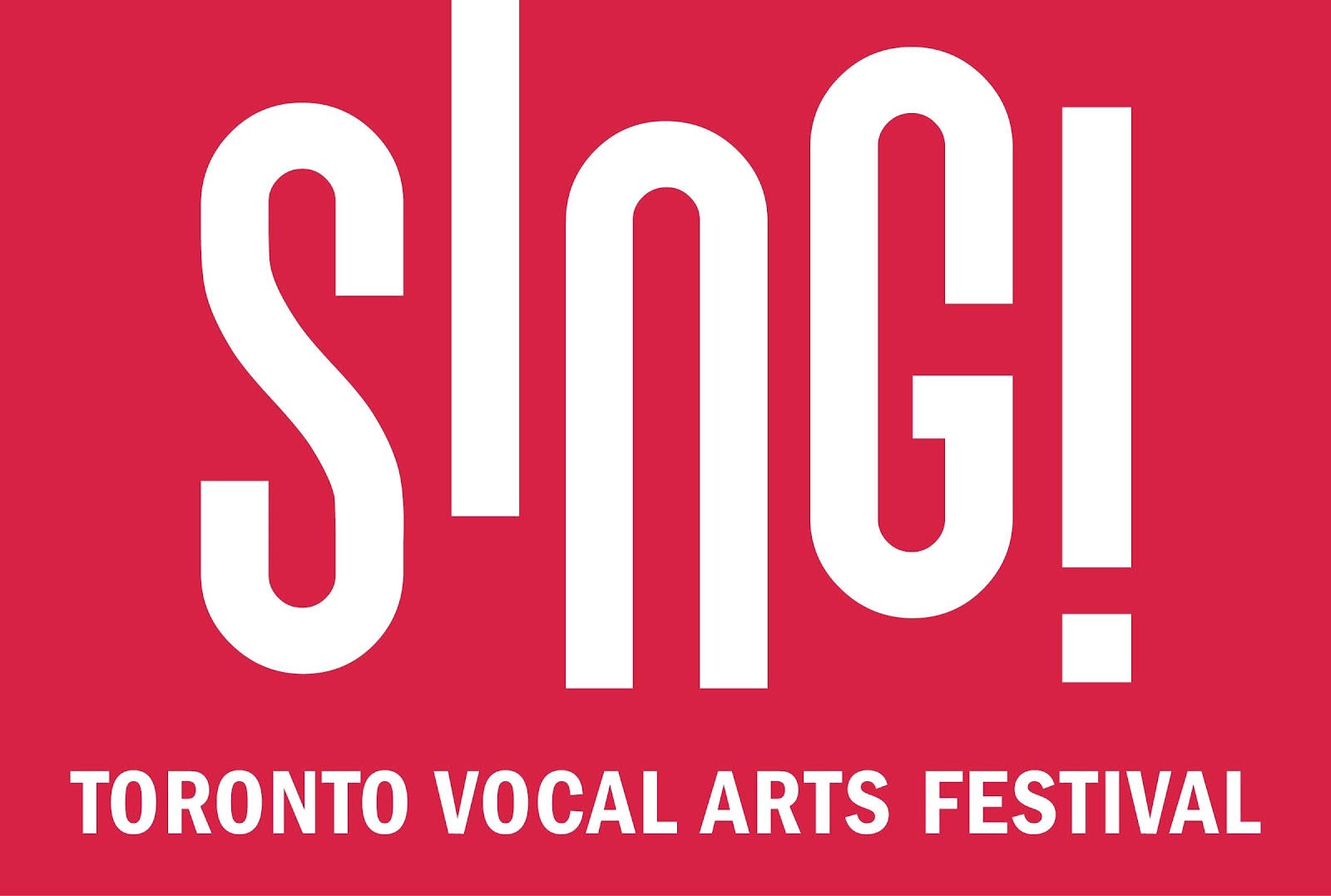 Sing! In Concert – O Canada! We Are The World
Sing! In Concert – O Canada! We Are The World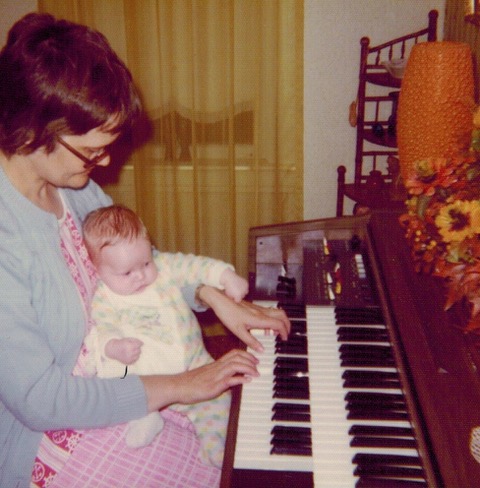 Prince Albert, Saskatchewan, 1976
Prince Albert, Saskatchewan, 1976